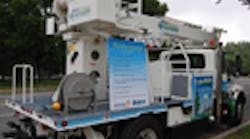California is going to fund hybrid truck and bus grants for a second year to the tune of $19 million – continuing a program the Golden State hopes will encourage commercial fleets adopt truck technology that reduces both fuel consumption and air pollution.
“These grants are important to help drive additional sales of what is still early generation technology that carries an incremental cost to baseline diesel technology,” Erik Neandross, CEO for environmental consulting firm Gladstein Neandross & Assoc., told Fleet Owner.
“Hybrid technology cost will always be incremental to this baseline technology cost,” he added. “Further, the high level of technology that we see in today’s hybrids is not cheap, especially in the low sales volumes we see in today’s market. So, until we see greater economies of scale, economies that theoretically [should] result in manufacturing efficiencies and lower costs, we will need grants to support hybrid developments.”
California’s Hybrid Truck and Bus Voucher Incentive Program (HVIP), begun last year under the auspices of the California Air Resources Board (CARB), provide vouchers on a first-come first-served basis to help California-based fleets purchase medium- and heavy-duty hybrid vehicles. At least $2 million of the $19 million in total grant funding will be set aside for public fleets operating in the golden State, CARB noted.
California-based public and private fleets can reserve a voucher for up to $40,000 through a participating truck dealership at the time the vehicle is ordered, with the voucher then redeemed at the time of purchase, the agency noted.
The HVIP program is managed by the Pasadena, CA-based Clean Transportation Technologies and Solutions (CalStart) organization, and John Boesel, CalStart’s president and CEO, noted that such state-level grants are filling an important gap left when federal tax incentives supporting the acquisition of hybrid trucks ceased nearly two years ago.
“The federal government currently provides zero tax credits or incentives for hybrid trucks – zip,” he told Fleet Owner, as federal tax credits for hybrid trucks expired at the end of 2009.
“We were extremely disappointed Congress did elect to reinstate the tax credits at the end of 2010. Thus, the incentives offered by California are playing a huge role in advancing the national market,” Boesel said. As a result, about one third of all hybrid trucks sold nationally in 2010 were sold in California.
CARB noted that the $20 million it provided to start the HVIP program in 2010 helped California fleets purchase over 650 hybrid trucks and buses, with almost half the vouchers for urban beverage-delivery vehicles and about 20% for package-delivery vehicles.
“The vouchers cut the additional cost of a hybrid truck in half,” CalStart’s Boesel said. “On a life cycle basis, with the voucher, the hybrid trucks make good business sense.”
Once sales volumes of hybrids increase to the point where vehicles pricing drops closer to that of diesel-only equipment, the need for incentives should decline and ultimately disappear, he added.
“If Congress would base incentives on actual environmental benefit and displacement of oil, there would be a healthy federal incentive for hybrid trucks,” Boesel noted. “And if there was a national program equivalent in scope to California's, it should be phased out in no more than five years.”




